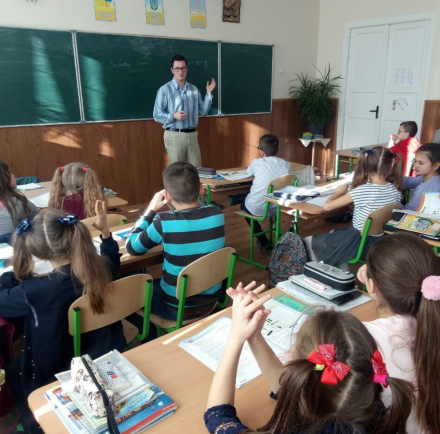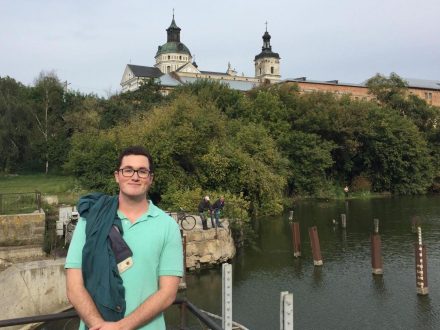Minton and Assistant Professor Jennifer Eidum discussed his time teaching English in Ukraine until the Russian invasion during an April 12 discussion.
Robert Minton ’18 discussed his time as a Peace Corps volunteer in Ukraine and then his time living there as a private citizen, during an April 12 discussion moderated by Assistant Professor Jennifer Eidum.

Minton started with the Peace Corps in August of 2018. He lived and trained in a small village in Zhytomyr region in western Ukraine, with a host family who spoke Ukrainian and Russian. His training consisted of learning Ukrainian and training to be a teacher. Minton was then placed at a school in Mukachevo, a city in western Ukraine, where he taught English and helped with teacher training.
He enjoyed most of his time in Ukraine and said that Ukrainians were very hospitable. People happily gave him directions or helped him when he looked confused.
“I had very positive experiences in Ukraine, I was afraid that I was going to butcher their language, but they were very happy I was speaking Ukrainian,” Minton said. “Most of the time they were trying to help me and were very encouraging.”
Fielding questions about views on Russia in Ukraine, Minton said that in his experience, Ukrainians in the western region were either indifferent when it came to Russia or were very anti-Russia. He said there are more nationalists in the west, and more people who only speak Ukrainian, instead of both languages.
Eidum, who served in south-central Ukraine as a Peace Corps volunteer, said that the central and eastern regions of Ukraine are more intertwined with Russia culturally and many have family in Russia. She described the complexity of Ukrainians who have family members in Russia who don’t believe that Russia is committing war crimes.

“They are deeply saddened and disappointed and horrified by the family members who live in Russia and have been listening to the Russian propaganda and they call and say, ‘wait is this true?’” she said.
When COVID-19 hit in March of 2020, Minton’s cohort was told that they had 24 hours to evacuate and get to the Kyiv airport. In all the confusion at the beginning of COVID-19, they were stranded at the airport, but the U.S. State Department was able to get them out about a week later.
Minton spent four months in the U.S. but decided to go back to Ukraine to be with his girlfriend, who is now his wife. He continued to teach English classes online as a private citizen.
Since there was a lot of skepticism about the war earlier on because Russia has previously threatened similar actions against Ukraine without follow-up, Minton didn’t leave right away. He decided to leave after U.S. National Security Advisor Jake Sullivan said that war could potentially break out in 48 hours. On Valentine’s Day, Minton and his wife traveled to Kladno, a small town outside of Prague, where they have been living since.
“We packed up our entire lives and put them in these bags,” he said, showing a photo of the belongings they took with them.
Minton is continuing to teach English online for his students, most of whom he says are internally displaced. He talks to 15 Ukrainian students about once or twice a week. He is also teaching English to a Ukrainian boy who lives in his apartment building in Kladno, who otherwise is not going to school due to the crisis.
He’s also been offering his observations about Ukraine on his blog, “Insight on Ukraine.”
While Minton has no guesses for how the war will turn out he said, he said that “the Ukrainian people now are incredibly nationalistic and occupied cities are going to be very difficult to occupy, if that even happens.”
Minton hopes that he can go back to Ukraine eventually, as he misses many aspects of his life there, from his apartment to the country being at peace.
“Imagine being told you have to leave immediately from your home, and you don’t know when you’re going to make it back,” he said. “You’re going to want to go back there.”


